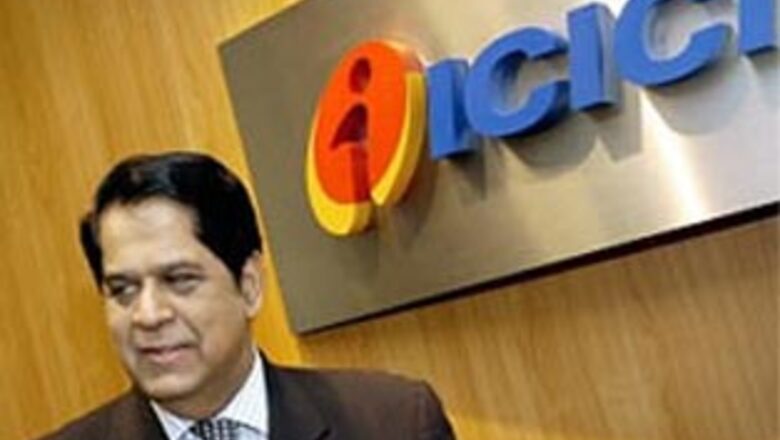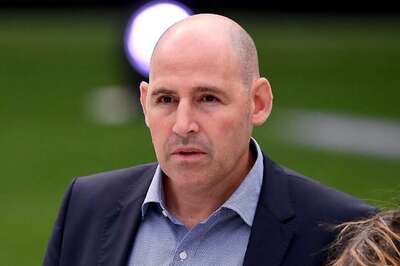
views
After a week of suffering very dismal news in Davos where the World Economic Forum (WEF) ,et, one came back with the sense that there was little hope that 2009 will bring any positive news to the global economy because of which India will continue to suffer.
However, that one voice that is always more optimist than those of others is that of KV Kamath, President of CII and MD and CEO of ICICI Bank. He believes that there are signs of a recovery already. India is not hurt as much as most of the economies around the world are, Kamath says.
Kamath says that the growth consensus is between 6 per cent and 7 per cent–7.5per cent for a year ahead and believes that 7.5 per cent number is also doable.
Kamath is of the view that the impact of global factors on India will not be very significant. According to him, India is not in need of a fiscal stimulus package but textiles, export industries, particularly in the small and medium enterprise (SME) sector, are in need of a helping hand urgently.
"To me, that is more than a fiscal stimulus, it would be direct injection of support in whatever form, a subsidy or otherwise."
Here is a verbatim transcript of the exclusive interview with KV Kamath on CNBC-TV18. Also watch the accompanying video.
CNBC TV18: I think that will be the one biggest statement anyone has heard this month that is you actually believe that there are signs of a soft landing for India or a recovery for India already in sight.
KV Kamath: Indeed; if you look at what others said: consensus is between growth of maybe 6% to 7%–7.5% for looking a year ahead. I believe that 7.5% number is doable. So India is not hurt as much as most of the economies around the world are.
How do I say that we will be at the upper end of this number? I think it is based on a dipstick survey amongst the CII CEOs. This was at the last National Council Meeting when we had about 45 out of 50 CEOs present. These same CEOs in November had no confidence at all that we would be up and doing things that we are doing today.
Same was the story in October whereas the same set of CEOs in July was extremely bullish. I am not saying that their confidence level just now is what it was in July but it certainly is quite different from what it was in November and I can explain this in more details as we go ahead.
CNBC TV18: You are saying 7.5% based on the positive comments that you are getting from CII manufacturers but the same industry leaders when we speak to them are asking for fiscal stimulus packages.
They are saying that earnings will continue to deteriorate, so on what basis do you believe that we are actually going to see a turnaround happened in the next two-three months?
KV Kamath: The steel industry was seeing no pick-up of stocks from the yard at all during most part of the last quarter. Today, that industry is back to full capacity production.
I am taking that as one basic mother industry, which actually feeds other industries. The same is the story with cement, you then go on to motorcycles — back at almost full capacity; you go to commercial vehicles, which is hurting badly; cars somewhere in between, so you have a sketchy sort of situation.
Let us see what sectors are doing well. Rural India continues to do well and that is 45% of the economy; you then have FMCG still doing well growing at 15-20% not 20-25%; knowledge areas i.e. services sector not growing at 20-25% again growing at 15-20%.
So the areas which are truly hurting now could be commercial vehicles, textiles, auto ancillaries and some areas of downstream oil where adjustment process is going on.
So if you take weight of all these things that I have talked about, you probably see about 75-80% of India back on track. Nothing stops us from doing the infrastructure investment that we need to do – that will happen; inflationary numbers are now looked at as probably 0% to 2%; interest rates probably set to fall another 1-2%.
To me that is hugely positive along with opportunity in infrastructure and the fact that most of these sectors that I have talked about are coming back to normal except for maybe 20% and that is where I say you do a weighting of all these things and you are looking at numbers back to 7-7.5%.
I will possibly then try to pitch too my past record — I have had in this is always being more optimistic than the others and probably being right over the last 10 years or so.
CNBC TV18: So you are saying that this the last quarter of pain — this January to March quarter — and that starting the next quarter in the beginning of the next fiscal earnings will start bouncing back?
KV Kamath: Yes. If you look at corporate India, they have had quarter-on-quarter (QoQ) growth of more than 20% for almost 18 quarters and this is the first quarter where we are all probably looking at a 15% deceleration in that growth — and that was a quarter when oil corrected by 66%, most of the commodities corrected by 66%.
Every company which was right in it got all their raw materials, all their work in process and finished good re-priced. So to me probably the worst hit was the quarter ending December, maybe some more hit in this quarter and then we should be back into a clearer territory with inflation down to near 0%, all output prices redone as it were because of input cost going down and interest rates coming down.
CNBC TV18: Do you believe that this is irrespective of what happens in the global economy because I know that the prognosis for the global economy in 2009? I am sure you have heard that as well while you were in Davos, was incredibly dismal. Everyone believed that 2009 would be if not as difficult an even more difficult year than 2008?
KV Kamath: I entirely agree with you on that part. The global scenario as seen through the lens of global entrepreneurs, global bankers or global thought leaders is really dismal. How much would it impact us? Yes, it will impact us to the extent we export but to the extent we import, we are going to get things much cheaper than we did. So it will have an impact but that impact I am factoring into that 20% which is of our growth which is impacted, the rest 80% should do well.
PAGE_BREAK
So there will be an impact but it will not be significant.
CNBC TV18: You believe that with rates coming down, with inflation coming down, consumer confidence will also bounce back in the economy in India?
KV Kamath: In India certainly yes. I think the tug-of-war on urban real estate still continues. I understand that rural maybe self occupied homes are getting built now at a pace but there is going to be a tug-of-war in certain areas of urban India. But in other areas where the customer feels the price is right and his borrowing costs are also right, he is going to go ahead and borrow.
CNBC TV18: As you are indicating a turnaround in the next quarter itself then can I assume that you don’t feel any need for any additional fiscal stimulus packages in the country?
KV Kamath: Package per se I don’t think we require.
CNBC TV18: For instance most specific proposals for textiles or something like that.
KV Kamath: I would say that textiles needs a bad helping just now in fact it needs helping urgently and similarly I would think export industries particularly in the SME sector need a helping hand urgently.
To me that is more than a fiscal stimulus, it would be direct injection of support in whatever form, a subsidy or otherwise and suddenly subsidy is not a bad word.
Everywhere around the world we are hearing this. So even those countries, which were free-market supporters are today talking of subsidies. So our own industry which is nascent would be absolutely right to seek some support in some of these areas.
CNBC TV18: So textiles, auto ancillaries all of those export oriented industries that might continue to suffer because of what is happening globally?
KV Kamath: Indeed.
CNBC TV18: Do you expect anything for the vote-on-account that is coming in on Monday?
KV Kamath: Not really because with elections now clearly are just a few months away, I would expect the vote-on-account to be truly that.
CNBC TV18: You don’t really want anything beyond that either because like you have just indicated that we don’t need a broad or wide ranging stimulus package of any sort?
KV Kamath: I would love to see some direct support for the industries that I mentioned but I probably would not expect it in the vote-on-account.
CNBC TV18: You don’t expect any tweaking in taxes or anything like that largely makes it easier, I know there have been all kinds of conversations people calling for lowering of fringe benefit tax, making it easier for people to have more money in their hands and go out and spend and therefore get the economy back on track faster but if you see a turnaround I guess you don’t feel the need for all of this.
KV Kamath: Realistically I won’t expect that to be done. I would be happy if we are in a position to keep interest rates low — lower still by another percent or two — the economy will get going.
CNBC TV18: Quick comment on the American stimulus package based on reports that it could be about USD 800 billion package and will have job creation at the center if they want to create 4 million jobs. What would you like to see in that package and do you believe that there is any fast route to recovery of the US economy that lies at the center of the problem?
KV Kamath: Historically, the US economy has rebounded very fast and there is that resilience in the economy. What would be required for this resilience to show up I think four things would be required. One is to make sure that the financial institutions are repaired so whether TARP did it or further amount is required summing for the determines that is one. Second one would be to repair their industrial machinery if it is hurt like they did prior the support for the auto industry, whether more such industrial is required.
The third is actually spending on building on America, so you create more jobs by building America, whether it is rejuvenating infrastructure or whatever way there is a whole lot of opportunities there. The fourth part is direct stimulus to the lay people- tax towards consumers, to pump prime as it were in that context.
PAGE_BREAK
So I think it will be these four steps that they will take and if history is anything to go by America does rebound quicker than most people expected so if the financial institutions are in good repair that there is a significant amount going there then I think it should rebound quickly.
CNBC TV18: So based on all the conversation that you had in Davos you are expecting 2010 to be the year of global economy in the later half of 2010?
KV Kamath: Davos signals to the Q4 of 2010, so it’s the latter half very extreme end of that, what I am really confused about at this point of time in a global context is the government intervention and it seems to be certain that there is no government everything that is being done everywhere in the environment.
I am not saying its good or bad but its clearly going to be there and second is whether there is anything going to be a wail of protection that has suddenly dropped on a whole lot of things that have been done globally in any which area and how would that impact a country like India is something that I would be very watchful of.
The third is and this is the real bothersome part of it, there seems to be no clarity in the minds of businesses nor governments or nor regulators globally as to what are the right steps and you cant blame them because I don’t think they have seen such impact before.
Everybody talks of depression but that was so long back and I don’t know whether that exactly fits what’s happening to day because this time around it is on multiple fronts that things have happened and this time around its multiple fronts that things have happened, so there is this lack of confidence to address a situation which is worrying me.
CNBC TV18: You also mentioned earlier in Davos and linking into this point, protectionism in the financial services sector that was worrying point for you that many banks that had been helped by their governments across the world were now being nudged to lend to only domestic companies and not to international or global or overseas companies, can you elaborate a bit more on what you see as some of the impacts of more governments or more state interventions, tighter regulations on the financial businesses across the developed world?
KV Kamath: The logic for what they are doing, I would follow a straight forward course that we have helped you survive, and we have a problem locally, so please lend locally and we don’t want you to take risks elsewhere.
When we have something that could be addressed at home, and how would this effect global business, or global trade flows is something to ponder because if every country starts doing this there is going to be a stand off.
So instead of actually releasing the log jam that the businesses are now in may actually accentuate it because every country goes into such a log jam and nobody wants to trade with each other and that is dimension of it which is again not very clear to me and if it is clear its not a pleasant thing to have.
CNBC TV18: What does that mean for corporate fund raising because if you are saying in the next quarter or so we are going to see earnings stabilize and move back into positive territory, so that means in the next 2-3 quarters we should hopefully see expansion plans back on track but where will the money come from?
KV Kamath: You have struck a very important point, those expansion plans will be critical for us to go back to 7.5 to 10% of growth and I am clear that we have potential for a 10% growth; the missing links would be the funding packages to get investment up and running.
PAGE_BREAK
In about two quarters from now corporate profitability should be back to more or less the levels we had say a year back or so. So the run rate would be quite good, the domestic banks are risk averse today as you said, but I would look at it slightly differently.
Domestic banks are in the lending mode and what’s happening is that domestic banks today see an opportunity on the treasury side which is significantly better in terms of returns than lending. That’ why I am of the view that the quicker we have the correction in treasuries we are done with and the banks will lend and this should have happened about a month back.
Then there was a spike which has been written up in the last week or two but I saw it happen a month back and that was uncertainty in the minds of traders and which shoot the bond rates up.
I would think that, that correction would start happening again and if it corrects in the next weeks or so that is by this quarter end and we are back to normal lending because banks will no other alternative but to lend
CNBC TV18: They seek earnings bounce back in the next two quarters and they were and they will feel more inclined towards lending?
KV Kamath: They will feel more comfortable to lend once its back to normal, so banks will come back and when corporate earnings will come back banks will be back in the market and the missing part of it will be if you need a liquidity support the equity markets will come back or global lending will happen.
I am not very confident of that happening in the next 2-4 quarters and certainly not two but maybe towards the end of four quarters, we may see some easing on that front and that will me an that our overall investment package or the investment quantum that will go through that’s going to be constraint to that extent and that may have an impact of growing at 10% but certainly not growing at 7.5-8%.
CNBC TV18: Many of the CEO’s that I spoke to in Davos believes that the golden period of consecutive years of 9% growth is something that is passed and its unlikely that India will get back to that golden period, for a variety of reasons, the global liquidity that we saw and the ability to capitalize on that, you don’t believe that all but you think we can still get back to not 9 but 10%, we haven’t lost that golden period at all?
KV Kamath: I respect other CEO’s views but I don’t agree with them, you again have to sometimes deal with the history, when structural change happens it stays for a long period. It started with Japan in mid-1950s, 25 years of growth, the tiger economy, again 25-30 years of growth, the south east Asia, 20 years of growth before the financial crisis hit them and now China with 20 plus years of growth, we were just into our third or fourth year of growth.
We have minimum of at least 15-20 years of growth and we look back at the countries they stopped growing at that pace and went into slower growth rates. The single reason why the growth trajectory changed was the slowly loosing competitiveness and the inability to go into higher and higher things to keep that competitiveness going at some stage that hits you.
So in our case we are starting at the base and there is so much to do, whether its in terms of infrastructure or competitiveness and we are still on the earlier curve to grow at a sustained pace for a structural change context, I am bullish on that.



















Comments
0 comment